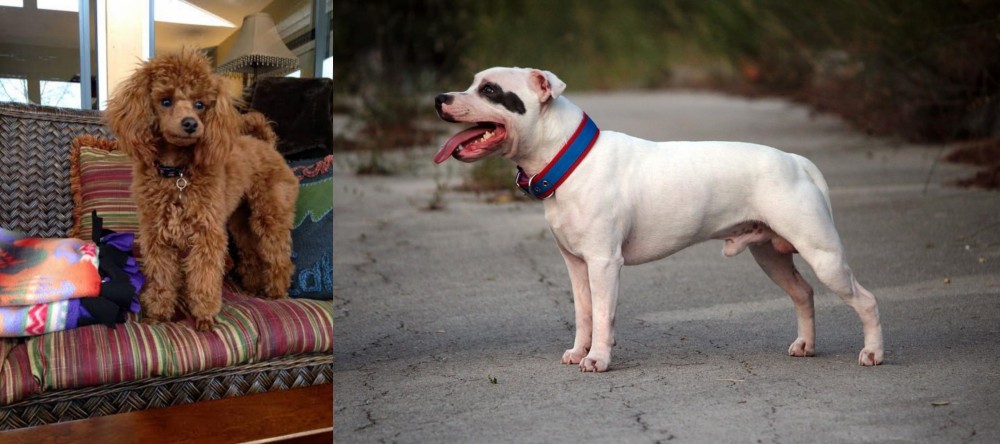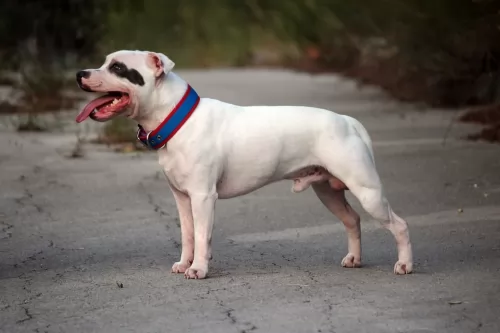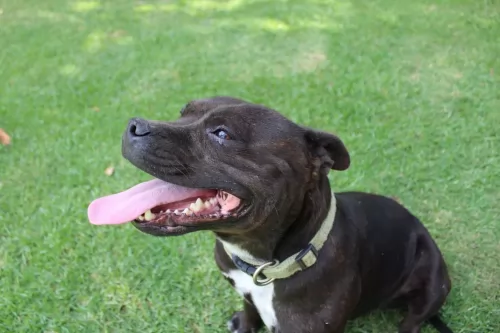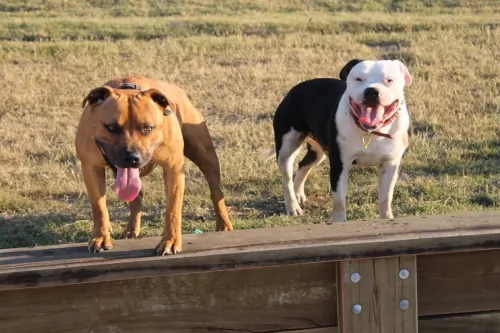 Petzlover
Petzlover Miniature Poodle is originated from Germany but Staffordshire Bull Terrier is originated from United Kingdom. Both Miniature Poodle and Staffordshire Bull Terrier are having almost same height. Miniature Poodle may weigh 9 kg / 19 pounds lesser than Staffordshire Bull Terrier. Both Miniature Poodle and Staffordshire Bull Terrier has almost same life span. Both Miniature Poodle and Staffordshire Bull Terrier has almost same litter size. Miniature Poodle requires Moderate Maintenance. But Staffordshire Bull Terrier requires Low Maintenance
Miniature Poodle is originated from Germany but Staffordshire Bull Terrier is originated from United Kingdom. Both Miniature Poodle and Staffordshire Bull Terrier are having almost same height. Miniature Poodle may weigh 9 kg / 19 pounds lesser than Staffordshire Bull Terrier. Both Miniature Poodle and Staffordshire Bull Terrier has almost same life span. Both Miniature Poodle and Staffordshire Bull Terrier has almost same litter size. Miniature Poodle requires Moderate Maintenance. But Staffordshire Bull Terrier requires Low Maintenance
 The Poodle is no stranger to the dog world and has been a familiar face in Western Europe for hundreds of years. Though they have lived in Europe for centuries, their origins are unsure, with some saying they hail from Germany and others say France.
The Poodle is no stranger to the dog world and has been a familiar face in Western Europe for hundreds of years. Though they have lived in Europe for centuries, their origins are unsure, with some saying they hail from Germany and others say France.
The Miniature Poodles have been used in both countries as gundogs for water birds.
They have always been admired for their intelligence, and Miniature Poodles are believed to have been bred from Standard Poodles. It is interesting to note the 3 official sizes of the Poodle are Toy, Miniature and Standard – all considered one breed and judged according to the same written standard, just with different size requirements.
 The Staffordshire Bull Terrier was first developed in the northern sections of Birmingham and in Staffordshire, England. The Staffie is a cross between a Black and Tan Terrie and the Bulldog, but had other breeds crossed in over time in order to create a bull-baiting dog and a fighting dog. In the Victorian age these sports were banned but dog fighting went underground and continues on some level today.
The Staffordshire Bull Terrier was first developed in the northern sections of Birmingham and in Staffordshire, England. The Staffie is a cross between a Black and Tan Terrie and the Bulldog, but had other breeds crossed in over time in order to create a bull-baiting dog and a fighting dog. In the Victorian age these sports were banned but dog fighting went underground and continues on some level today.
The Staffordshire Bull Terrier was exceptional at these “sports” due to his build, power and jaw strength. Today’s Staffie is a descendent of those early Bull Terrier crosses. Together with the Bull Terrier and the American Pit Bull, the Staffie also traces its roots back to those original English Bully dogs. All three breeds have the Bulldog in common.
After dog fighting and bull baiting were banned the Stafforshire Bull Terrier was further developed as a companion and pet. Still their reputation as fighting dogs cost them recognition in the official kennel clubs for some time. They finally made the UK registry in 1935, but it was not until 1974 that the American Kennel Club (AKC) accepted them.
 With good care the lifespan of the Miniature Poodle is 14 – 16 years of age. This purebreed dog is small, standing at 28 – 38cm in height and weighing 7 – 8kg.
With good care the lifespan of the Miniature Poodle is 14 – 16 years of age. This purebreed dog is small, standing at 28 – 38cm in height and weighing 7 – 8kg.
The coat is typically curly, springy and dense. Colors of the coat can be cream, beige, silver, black, brown or apricot. They are low shedding dogs and are regarded as being hypoallergenic. The ears are floppy and the tail is usually docked to give the dog a nice, compact look.
The Miniature Poodle is intelligent and learns easily, so you won’t have any trouble with training him and having him socialized.
He is a lively dog and loves a game and a walk, loving as much time as possible spent with his human family. He gets on well with other pets in the home as well as with children who have been taught to be kind and gentle with animals.
They are not overly-friendly with strangers, and therefore make excellent watchdogs. They’re the kind of dogs who need both physical and mental stimulation though, and he won’t be content to be left and ignored – after all he counts himself as a member of your family! They make wonderful pets, being playful and energetic and loving water, always ready to swim with you.
 The Staffordshire is a muscular, stocky and unusually strong breed, small to medium size in height and build. They have broad, powerful chests, wide set, strong legs, strong shoulders, broad head with a fairly short muzzle. Their ears are not cropped but they are short and fold over. The coat is stiff, close and short and the tail is medium and carried low. Most Staffies are brown, but they can be red, brindle with white, fawn, black, white or blue.
The Staffordshire is a muscular, stocky and unusually strong breed, small to medium size in height and build. They have broad, powerful chests, wide set, strong legs, strong shoulders, broad head with a fairly short muzzle. Their ears are not cropped but they are short and fold over. The coat is stiff, close and short and the tail is medium and carried low. Most Staffies are brown, but they can be red, brindle with white, fawn, black, white or blue.
 When you take a Miniature Poodle into your home and your heart, there are many wonderful positive aspects that come with him.
When you take a Miniature Poodle into your home and your heart, there are many wonderful positive aspects that come with him.
You won’t have any trouble training him as he is clever and bright. He is such a loving, loyal pet and he takes his job of guarding you seriously too.
Because they aren’t aggressive, they're easy to keep in the city or the countryside, so long as he receives plenty of love, companionship and exercise. Perhaps the only thing that may require a little bit of effort on your part is the fact that his coat will require quite a bit of upkeep to keep it looking good and healthy.
In exchange for looking after him, you’re going to benefit from having a wonderful canine friend and family pet in your life for many years.
 1.Children friendliness The breed adores children but care should still be taken because they are so strong and their jaws are so powerful.
1.Children friendliness The breed adores children but care should still be taken because they are so strong and their jaws are so powerful.
2.Special talents they adore children and they one of the most powerful jaws among canines.
 Dog’s thrive on good nutrition and exercise, and if your Miniature Poodle gets both of these combined with plenty of love, he can live to be up to 16 years of age and even older.
Dog’s thrive on good nutrition and exercise, and if your Miniature Poodle gets both of these combined with plenty of love, he can live to be up to 16 years of age and even older.
They are robust little dogs, but even so, they can get sick. Ear infections, joint diseases, obesity, dental disease and bloat are common dog diseases to look out for -
This is a life-threatening condition where your pet’s stomach fills with gas. The swollen stomach puts pressure on the diaphragm and the dog battles to breathe. The dog could also vomit, be drooling and lethargic.
The stomach can also twist putting the dog in shock. This bloating can occur with any dog breed and efforts can be made to avoid it by feeding the dog smaller more frequent meals as opposed to one larger meal which he gobbles up.
The dog shouldn’t exercise immediately after a meal either. You also want to avoid obesity at all costs.
When the mitral valve malfunctions, blood isn’t being pumped out of the heart to the rest of the body. If the mitral valve weakens or leaks it can lead to endocarditis.
Quite a number of dogs develop some form of heart disease during their lifetime, with a high percentage being due to mitral valve insufficiency, which is more common in smaller dogs.
Your dog may have a cough, be lethargic and lose weight. The first signs of a leaking mitral valve is a heart murmur. At first MVI doesn’t have obvious clinical signs, but with time the efficiency of the heart is reduced and congestive heart failure develops. Your veterinarian will evaluate your pet and suggest treatment.
A skin problem sounds fairly mild but it can cause havoc in your pet’s life, causing him to be constantly licking and scratching himself. The hair becomes dull and brittle, and breaking the skin from continuous scratching invites bacterial infection. These skin infections will require veterinary intervention.
 • Patella luxation otherwise known as a slipped kneecap- can cause pain and some lameness.
• Patella luxation otherwise known as a slipped kneecap- can cause pain and some lameness.
• Skin allergies and even a tendency toward Mange which is chronic in some forms and fatal in others.
• Like most active dogs their size, they are susceptible to bloat which can be fatal if not treated immediately.
 If you opt to keep your Miniature Poodle’s coat long, it will actually require regular brushing – every day in fact, if you want to avoid matting and tangling. Most people don’t like the work this involves and they have their Poodle’s hair cut short all over, then he only needs a brush once or twice a week. Your Miniature Poodle just loves the time you spend with him grooming him. It’s your time to feel for any unusual lumps and to also check for fleas and ticks. Some people take their pet to the doggy parlor to have the coat clipped.
If you opt to keep your Miniature Poodle’s coat long, it will actually require regular brushing – every day in fact, if you want to avoid matting and tangling. Most people don’t like the work this involves and they have their Poodle’s hair cut short all over, then he only needs a brush once or twice a week. Your Miniature Poodle just loves the time you spend with him grooming him. It’s your time to feel for any unusual lumps and to also check for fleas and ticks. Some people take their pet to the doggy parlor to have the coat clipped.
The dog’s nails should also be trimmed regularly, and their ears also need to be checked for wax buildup and debris which can lead to an ear infection.
Teeth need to be checked over too because dental disease won’t only lead to loss of teeth but it could be toxic for important body organs too.
Wipe around your pet’s eyes as tear stains can form under the eyes.
Make sure to feed your pet a top quality diet full of vitamins and minerals. Get to know the foods which can be toxic for your pet and cause stomach upsets. Dogs appreciate simplicity and consistency with their diets, and apart from dry kibble, home-made food such as boiled chicken, brown rice and vegetables can be excellent for your pet.
 1.Feeding the puppy Don’t over feed as he grows fast. Feed a high quality dog food for medium size puppies. Feed 1-2 and a quarter cups in 3-4 meals per day.
1.Feeding the puppy Don’t over feed as he grows fast. Feed a high quality dog food for medium size puppies. Feed 1-2 and a quarter cups in 3-4 meals per day.
2.Feeding the adult Don’t exercise right before or after eating due to potential for bloat. Feed 1-2 times a day a high quality medium breed dog food.
4. Games and Exercises They are terriers after all and they dig. Need a fairly large yard with a strong fence. They love to play ball, frisbee and can excel at cart pulling.